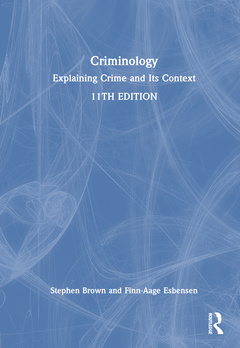Description
Criminology (11th Ed.)
Explaining Crime and Its Context
Authors: Brown Stephen E., Esbensen Finn-Aage, Geis Gilbert
Language: English
Subject for Criminology:
281.07 €
Not Yet Published
Add to cart· 17.8x25.4 cm · Hardback
Description
/li>Contents
/li>Readership
/li>Biography
/li>
Criminology: Explaining Crime and Its Context, Eleventh Edition, offers a broad perspective on criminological theory. It provides students of criminology, criminal justice, and sociology with a thorough exposure to a range of theories about crime, contrasting their logic and assumptions, but also highlighting efforts to integrate and blend these frameworks.
In this new edition, the authors have incorporated new directions that have gained traction in the field, while remaining faithful to their criminological heritage. Among the themes in this work are the relativity of crime (its changing definition) with abundant examples, historical roots of criminology and the lessons they have provided, and the strength and challenges of applying the scientific method. This revision offers new chapters on critical theory and on life-course criminology. It is updated throughout to reflect current trends in criminological theory and data.
With chapters both updated to reflect recent developments in the field and made easier to digest, this text is essential reading for students of criminology, criminal justice, sociology, and related fields.
PART 1: FOUNDATIONS FOR CRIMINOLOGY Chapter 1 Crime and Criminology Chapter 2 The Relativity of Law, Crime, and Deviance Chapter 3 Crime Data and Distribution PART 2: THEORIES OF CRIME Chapter 4 Deterrence and Rational Choice Theories of Crime Chapter 5 Positivism and BioPsychoSocial Criminology Chapter 6 Social Structure Theories of Crime Chapter 7 Social Process Theories of Crime Chapter 8 Social Reaction Theories of Crime: Labeling Chapter 9 Social Reaction Theories of Crime: Conflict and Beyond Chapter 10 Life-Course Criminology PART 3: TYPES OF CRIME Chapter 11 Violent Crime Chapter 12 Economic Crime Chapter 13 Crimes without Victims and Victims without Crimes
Stephen E. Brown is Professor of Criminology and Criminal Justice at Western Carolina University where he served as Department Head for over 10 years. He received his Ph.D. in Criminal Justice and Criminology from the University of Maryland in 1979. He went through the professorial ranks at East Tennessee State University, serving as Department Chair for 11 years, and left as Professor Emeritus in 2008. Brown has published articles in a number of journals, including Criminology, Journal of Criminal Justice, Journal of Criminal Justice Education, Criminal Justice Review, Youth and Society, and Social Science Quarterly. His areas of research interest have been broad, covering topics such as family violence, deterrence, delinquency, and application of statistics within criminology. He has served as a Trustee on the board of the Academy of Criminal Justice Sciences, and as editor of the American Society of Criminology’s The Criminologist. He co-edited the Routledge Handbook on Deviance in 2018.
Finn-Aage Esbensen is an Emeritus E. Desmond Lee Professor of Youth Crime and Violence in the Department of Criminology and Criminal Justice at the University of Missouri, St. Louis. He served as Department Chair from 2009 to 2018. His previous faculty positions were at Western Carolina University (1982–1986) and the University of Nebraska at Omaha (1992–2001). In addition to these academic appointments, he has held research positions at the following institutions: the Center for Criminal Justice at Harvard Law School (1974); Catholic University (1976–1977); the Behavioral Research Institute, Boulder, Colorado (1980–1981); and the Institute of Behavioral Science, University of Colorado (1987–1992). He received his B.A. and M.A. from Tufts University and his Ph.D. from the University of Colorado. He is the author of more than 100 articles and chapters examining, among other topics, youth gangs and viol




